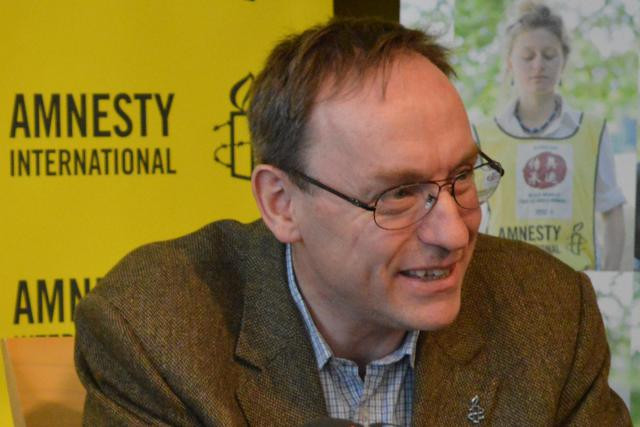Jess Bauldry: Briefly, how would you assess the past year in human rights globally?
Stan Brabant: The past year has been very challenging for human rights defenders in general and for Amnesty International in particular. One year ago, the Russian authorities ordered the closure of our Moscow office. Six months ago, the Turkish authorities arrested the chair of our section in Turkey, Taner Kilic. One month later, they arrested the director of Amnesty Turkey, Idil Eser, together with nine other human rights defenders.
The wars in Syria and Yemen keep causing pain and suffering--and massive (and underreported) human rights violations. In the United States, the election of Donald Trump unleashed discrimination and racism at the highest level. And human rights defenders are increasingly at risk in about 100 countries, with a growing number of assassinations and “disappearances” among defenders.
Despite this very bleak picture, General Ratko Mladic (known as the Butcher of Bosnia) was finally convicted for genocide and crimes against humanity; Robert Mugabe resigned as resident of Zimbabwe after a 37-year rule marred by killings, torture and enforced disappearances; and the International Criminal Court requested an investigation into crimes committed in Afghanistan since 2013 by all sides, including US forces. So there is hope!
And in Luxembourg?
In Luxembourg, the government has become increasingly supportive of human rights defenders, in particular during its bilateral meetings with leaders from authoritarian governments. The Foreign Minister's visit to Moldova in September has led the Moldovan government to rapidly withdraw a bill on NGOs modelled on the Russian law on “foreign agents” . This was such a relief!
How important is the human rights festival in the context of Amnesty International Luxembourg’s work?
Phyoe Aung (Myanmar), Erkin Musaev (Uzbekistan), Fred Bauma and Yves Makwambala (DR Congo), Chelsea Manning (United States) and many others. This year’s festival is particularly important since it focuses on human rights defenders at risk in 10 countries.
What are the highlights of this year’s human rights festival?
Probably the participation of five human rights defenders: Margaret Pineda and Martin Gomez (Honduras), Idil Eser (my Turkish colleague who was released in prison a short while ago following a massive mobilization of Amnesty supporters, in Luxembourg and all over the world), Dieudo Hamadi (DR Congo) and Sergei Nikitin (the former head of Amnesty’s office in Moscow). The event with Margarita Pineda and Martin Gomez on December 2 should be quite powerful.
The event with Idil Eser and Sergei Nikitin is supposed to involve foreign minister Asselborn, which could be quite interesting in view of the role he played in recent months to support human rights defenders at risk. The “Marche aux flambeaux” on December 10 in Luxembourg, but I am looking forward to the letter-writing evening that will follow at the heart of Amnesty’s work.
To find out more about the human rights festival in Luxembourg, visit www.festival.amnesty.lu
